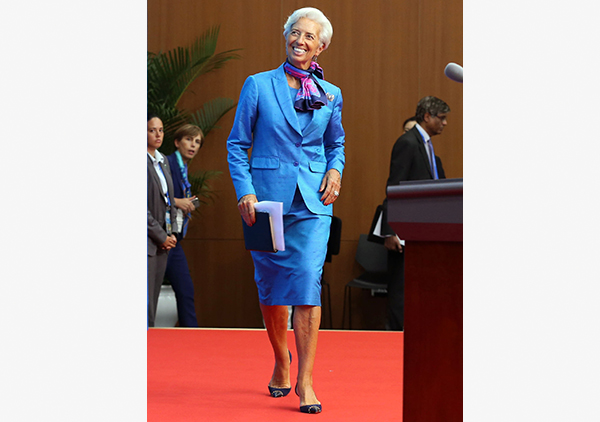IMF looks to expand Special Drawing Rights
Updated: 2016-09-06 07:27
By Li Xiang in Hangzhou(China Daily)
|
||||||||
 |
|
International Monetary Fund Managing Director Christine Lagarde walks to the podium before a news conference at the G20 Summit news center on Monday. [Photo/China Daily] |
The International Monetary Fund is exploring ways to broaden the use of its Special Drawing Rights after the leaders of the G20 reached a consensus on the matter at the G20 Summit in Hangzhou to enhance the resilience of the international financial system, IMF chief Christine Lagarde said on Monday.
"The IMF was really encouraged by the determination of China to use the SDR as a yardstick to measure reserves and as a currency for bond issuance," Lagarde told reporters at a news conference after the conclusion of the summit.
The call for greater use of SDR, a synthetic reserve currency administrated by the IMF, has been strongly backed by China as the country has been working to lift the global profile of its currency. The yuan will be officially included in the IMF's currency basket on Oct 1.
Lagarde vowed that the IMF will continue to expand the representation of emerging and developing economies in the organization as it needs to serve the entire membership.
The IMF chief also reiterated that the Chinese currency meets the criteria for the inclusion in the SDR as the Chinese monetary authority has made "constructive progress" by making its monetary policy more market-determined.
Experts said that the expansion of the use of the SDR will help improve the stability of the global financial system and the inclusion of the Chinese currency will in turn empower the influence of the SDR in international markets.
"The yuan's inclusion in the SDR will, to some extent, increase the influence of the SDR and enable it to play a greater role in the international financial markets," said E Zhihuan, an academic committee member at the International Monetary Institute of Renmin University of China.
The World Bank issued a landmark bond denominated in the IMF's SDRs in the Chinese interbank market last week.
World Bank President Jim Yong Kim said earlier that issuance of SDR bonds in China would support the G20's objective of expanding the use of the SDR, which has been listed as one of the G20's key financial tasks.
At Monday's news conference, Lagarde also said that the G20 leaders have endorsed several initiatives to support stability and resilience of the international financial architecture, which included the support for further strengthening of the global financial safety net with an adequately financed IMF equipped with a more effective tool kit.
"Global financial governance has been a big topic. After the January surge in market volatility, cooperation between countries has improved greatly and the G20 has been a suitable venue to cement the ties in that regard," said Hong Hao, chief strategist at BOCOM International Holdings in Hong Kong.
Chen Yingqun contributed to this story.
Quotes from Christine Largarde, IMF managing director , Reuters
"A first priority is a coordinated effort to raise growth. The G20 agreed that this will require making full use of all policy levers-monetary, fiscal, and structural-individually and collectively. The G20 also agreed to identify and prioritize reforms that provide the biggest growth impulse for each country, which is an area where the IMF is actively engaged. Pushing back against protectionism and pushing forward with free and fair trade is a vital component of this growth agenda."
"A second priority is a commitment that growth must be more widely shared. Again, countries should deploy proven tools to reduce excessive inequality and raise economic prospects, particularly for low-income groups and workers affected by rapid technological change-for example, through skills training and investments in education and health. We need increased growth, but it must be better balanced, more sustainable, and inclusive so as to benefit all people."
"On the low-growth trap, we take the very strong view that policymakers have to act upon the current situation, they have to use all positive tools and levers in order to respond to that risk, which is why I said monetary policy where possible, but where stretched too thin, use fiscal policy in order to stimulate demand, which we are short on at the moment."
- Britain's ex-leader Cameron resigns as lawmaker
- US flies B-1B bombers over ROK after DPRK's nuke test
- S Korea jolted by biggest-ever earthquake, tremor felt nationwide
- Cuba, US hold first talks on intellectual property
- Princeton, Cal top college rankings
- Clinton says may restart campaigning in a 'couple of days'

 Orphaned Chinese marries American at SOS village
Orphaned Chinese marries American at SOS village
 French royal porcelains shine in Xi'an
French royal porcelains shine in Xi'an
 How to raise great kids? A case for twin girls
How to raise great kids? A case for twin girls
 Photographers capture the fun side of a full moon
Photographers capture the fun side of a full moon
 Top 10 most valuable companies in China
Top 10 most valuable companies in China
 US marks 15th anniversary of 9/11 attacks
US marks 15th anniversary of 9/11 attacks
 Beautiful, smart robots shine at expo in Nanjing
Beautiful, smart robots shine at expo in Nanjing
 In pics: Top 10 most global cities in 2016
In pics: Top 10 most global cities in 2016
Most Viewed
Editor's Picks

|

|

|

|

|

|
Today's Top News
Trump outlines anti-terror plan, proposing extreme vetting for immigrants
Phelps puts spotlight on cupping
US launches airstrikes against IS targets in Libya's Sirte
Ministry slams US-Korean THAAD deployment
Two police officers shot at protest in Dallas
Abe's blame game reveals his policies failing to get results
Ending wildlife trafficking must be policy priority in Asia
Effects of supply-side reform take time to be seen
US Weekly

|

|









